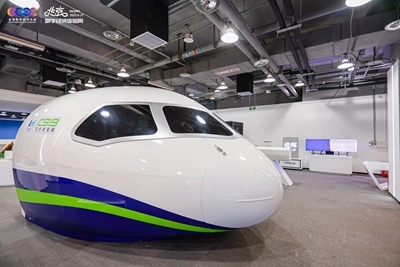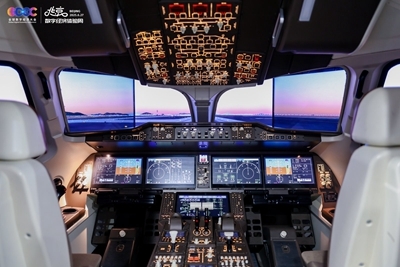By Wu Siya
BEIJING, June. 30 (China Economic Net) – How many people have ever dreamed of being a pilot? In the ancient neighborhood of Beijing Fun, Qianmen in Beijing, this dream could be realized with just a small digital cockpit.
“Our experience simulation cockpit completely replicates the cockpit of China’s first self-developed mainline passenger aircraft C919, equipping with a full-process flight operation system,” a staff from Harbin Wright Brothers Technology, a pilot training equipment R&D and manufacturing company, told China Economic Net.
The reporter learned that as of now, Wright Brothers has established more than a hundred flight experience stores and large-scale aviation science popularization pavilions across the country, with the number of delivered digital science popularization experience devices exceeding 200.


C919 science experience simulation cockpit [Photo/GDEC]
As the prelude to the 2025 Global Digital Economy Conference which officially opened on July 2, the Beijing Digital Economy Experience Week integrated century-old historical buildings with cutting-edge digital technologies, bringing together more than 50 technology companies and more than 10 immersive exhibition areas within an area of 6,000 square meters.
The AI bazaar, another key event of the experience week, brought together many cutting-edge digital technologies, with the products of participating companies were unique, but all integrated their products with AI. The entertainment area was tailored for children, bringing together mainstream AI toys on the market, such as AI pet companion robots, AI robot dogs, AI mirrors, AI alarm clocks, and AI trendy toys.


AI bazaar showcases creative digital products [Photo/GDEC]
“The AI game market is a hot spot in the current game industry; thus, we have taken advantage of this opportunity to develop an AI robot dog. On the one hand, it can communicate with children seamlessly, and on the other hand, it has a built-in AI large model learning interactive program, allowing children to gain knowledge while playing.” said Yan, CTO of Shenzhen Liangxu Huanyou Technology.
So far, Beijing has formed a complete digital economy system with artificial intelligence, big data, cloud computing and blockchain as the core.
Beijing is in a leading position in the construction of global digital economy benchmark cities, and is in the first echelon together with cities such as San Francisco. Among the top 100 global digital benchmark unicorn companies, 8 of which in Beijing, with a market value of 1984.6 billion yuan, ranking second in the globe. Last year, the added value of Beijing’s digital economy has reached 2 trillion yuan, a year-on-year increase of about 7.5%. The number of existing artificial intelligence companies in the city has exceeded 2,400, and the scale of core industries has exceeded 300 billion yuan.
In 2025, Beijing will continue to accelerate the promotion of the deep integration of the digital economy and the real economy, as well as achieve the annual goal of an 8% increase in the added value of the digital economy and a proportion of more than 45% of the city’s GDP.
(Editor: fubo )


